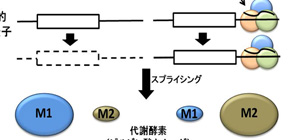
Embryonic microRNA-369 controls metabolic splicing factors and urges cellular reprogramming
May be useful for novel diagnostic approaches and therapies in regenerative medicine and cancer research
In collaboration with the Department of Surgery, Osaka University (Profs. Hideshi Ishii , Yuichiro Doki , and Masaki Mori ), Masamitsu Konno et al. found a unique role of the embryonic miR-369-HNRNPA2B1 axis in controlling metabolic enzyme function. The data suggests a novel pathway linking epigenetic, transcriptional, and metabolic control in cell reprogramming, and may be useful for novel diagnostic approaches and therapies in regenerative medicine and cancer research.
Abstract
Noncoding microRNAs inhibit translation and lower the transcript stability of coding mRNA, however miR-369 s, in aberrant silencing genomic regions, stabilizes target proteins under cellular stress. We found that in vitro differentiation of embryonic stem cells led to chromatin methylation of histone H3K4 at the miR-369 region on chromosome 12qF in mice, which is expressed in embryonic cells and is critical for pluripotency. Proteomic analyses revealed that miR-369 stabilized translation of pyruvate kinase (Pkm2) splicing factors such as HNRNPA2B1. Overexpression of miR-369 stimulated Pkm2 splicing and enhanced induction of cellular reprogramming by induced pluripotent stem cell factors, whereas miR-369 knockdown resulted in suppression. Furthermore, immunoprecipitation analysis showed that the Argonaute complex contained the fragile X mental retardation-related protein 1 and HNRNPA2B1 in a miR-369-depedent manner. Our findings demonstrate a unique role of the embryonic miR-369-HNRNPA2B1 axis in controlling metabolic enzyme function, and suggest a novel pathway linking epigenetic, transcriptional, and metabolic control in cell reprogramming.
The figure shows that Embryonic microRNA-369 controls metabolic splicing factors and urges cellular reprogramming.
To learn more about this research, please view the full research report entitled " Embryonic MicroRNA-369 Controls Metabolic Splicing Factors and Urges Cellular Reprograming " at this page of the PLOS ONE website.
Related link

